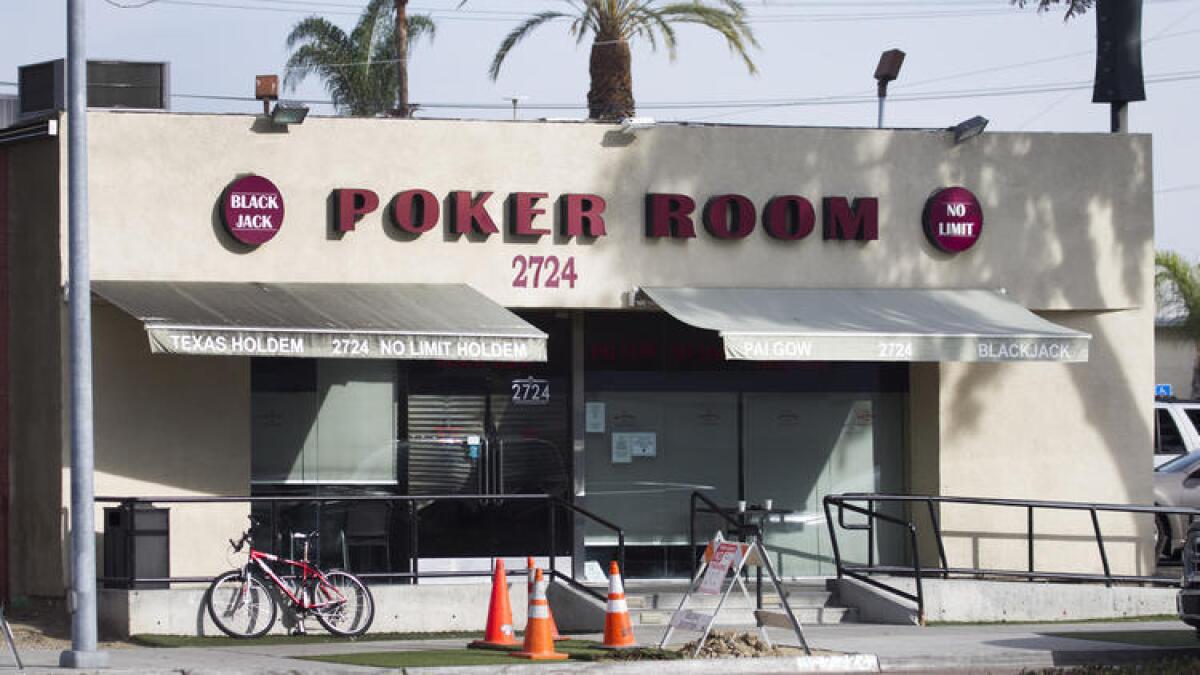Luck running out on San Diegoâs once-thriving card room industry

Reporting from San Diego â The front door of the Palomar Casino is milky with dust and grime from the street. Fliers are taped to the windows, one of them instructing former patrons how to cash in any gambling chips they may have.
The once-thriving card room industry in San Diego is nearly bust, done in over time by a city law adopted in the 1980s â and more recent federal criminal indictments against the two remaining establishments.
The Palomar is officially closed, its license to operate revoked in an agreement reached over the summer with state gambling regulators. About three miles east down El Cajon Boulevard, the Lucky Lady is open and busy, but it too faces licensing troubles.
The California Gambling Control Commission has filed an administrative accusation against the club. There is also the pending federal indictment and, most recently, trouble with the city.
The San Diego Police Department last month denied an application from the Lucky Lady and its longtime owner, Stanley Penn, for renewal of its permit to operate. The current permit runs through November 2017.
The denial was issued because the card room did not disclose on its application submitted in August that it had been named in the federal indictment that was unsealed in July.
The Lucky Lady plans to appeal the denial, said Pennâs lawyer, Gretchen Von Helms. She was critical of the reasoning behind the denial, noting that the police department was involved in the two-year-long investigation â and therefore fully aware the card room was under indictment.
âWeâve contested that decision and are going to appeal it,â she said. âThe use permit to operate the Lucky Lady is still in full force and effect.â
The indictment outlined what investigators said was a decade-long illegal sports gambling book operating out of the Lucky Lady.
Federal authorities allege the card room acted as a front for an international illegal sports betting business, commingling cash from the legal gambling at the Lucky Lady with proceeds from the sports book.
In all, 14 people were charged, including Penn, who has pleaded not guilty.
That indictment followed one targeting the Palomar Casino that was unsealed in December. In that case, authorities alleged a bookmaker named Dave âFat Daveâ Stroj used the casino as a venue to launder proceeds from an international sports betting ring that he headed.
The indictment charged the card room manager and the corporation that owns the business, as well as 23 others. The case is ongoing in federal court.
Even before the indictment, the Palomar was under scrutiny from state regulators.
In October 2015, the Gambling Control Commission filed an administrative accusation against the owners, Donald and Susan Staats, alleging they had improperly turned over operation of the club to their adult daughter in 2013. State officials alleged they werenât told of that change, and the daughter did not have a license to operate a gambling establishment â both violations of state law.
In August, the Staats settled the matter with the state by agreeing to a revocation of their licenses to operate the card room. The effective date of the revocation was delayed for two years, but the agreement stipulated the card room had to remain closed during that time.
Lorena Von Kaenle, who represents the Staats, declined to discuss the settlement with the state.
The reason for the delay in the revocation was to allow for a possible sale of the assets or ownership of the card room, according to the agreement. But such a sale would require a change to a city law adopted in 1983.
At that time, more than three dozen card rooms operated in San Diego. The ordinance prohibited any new ones and banned the sale or transfer of licenses. Existing licenses to individuals like the Staats or Penn were to terminate when they died.
The law spelled the eventual end of card rooms in the city. As owners have died, card rooms closed â leaving only the Palomar and Lucky Lady.
Jarhett Blonein, a Sacramento lawyer who represents the approximately 80 licensed card rooms operating across the state, said San Diegoâs law was enacted to curb what officials said was a steady increase in crime associated with the businesses. No other city in the state has such a rule, he said.
In January 2014, a move was made to change the law to allow a sale or transfer of ownership from the Lucky Lady and Palomar owners. A city council committee approved the proposal, but it never made it to the full council for a vote.
That was around the time the federal investigations into sports book operations were underway. With the indictment this year, Blonein said, there is likely little appetite to revisit the issue.
âI assume the will of the city to change the ordinance is gone because of this string of bad operators,â he said.
Moran writes for the San Diego Union-Tribune
ALSO
Massive fire guts housing development in Oaklandâs growing Lake Merritt district
Southern Californiaâs deadliest quake may have been caused by oil drilling, study says
Ex-cop broke into estranged wifeâs boyfriendâs home and threatened to kill him, prosecutors say
More to Read
Sign up for Essential California
The most important California stories and recommendations in your inbox every morning.
You may occasionally receive promotional content from the Los Angeles Times.










